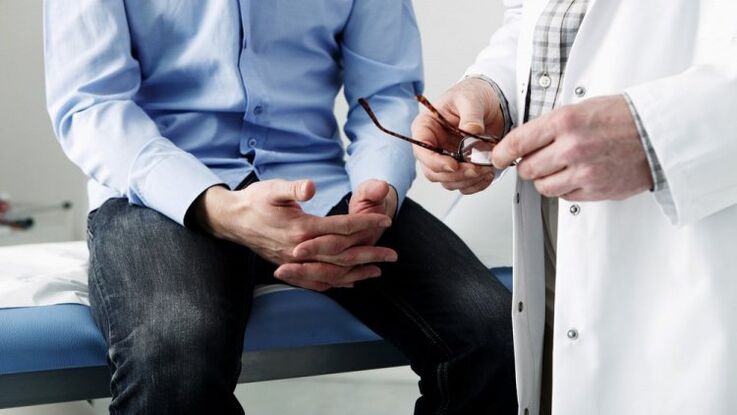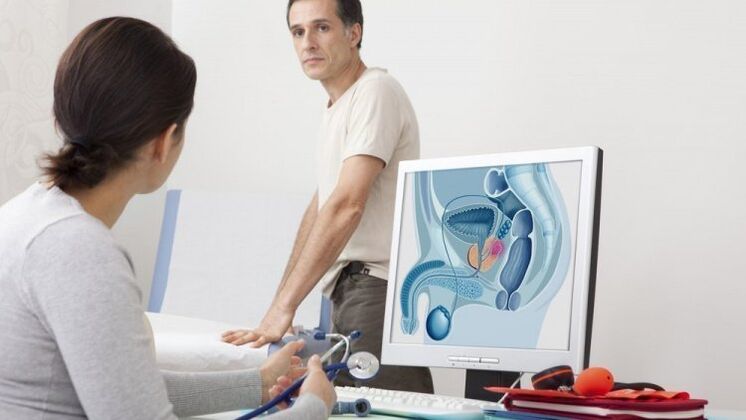The inflammatory process of the prostate (prostate) is usually called prostatitis. The prostate is an exclusive male organ located in the pelvic area below the bladder. It has several functions: the secret of the prostate is part of the sperm. During sexual arousal, the gland acts as a sphincter-it blocks the entrance to the bladder.
Prostatitis: the urgency of the problem
According to American researchers, approximately 25% of patients with urinary system problems will find prostatitis. Generally speaking, about 9% of the global male population suffers from this disease.
In one country, this pathology covers approximately 35% of young men, and 7-30% of them have a complicated form of prostatitis, ranking first among all diseases of the male reproductive system. This is probably due to the mentality of our population-only a small percentage of men seek qualified medical help on time. Normally, the signs of prostatitis are ignored until the condition becomes very serious.
Although this disease does not pose a serious threat to life, it can complicate a person's life, cause him to fall into severe depression, deprive him of simple happiness, and make him infertile to the extreme.
Acute and chronic prostatitis

According to the classification adopted by the United States in 1995, prostatitis is divided into the following forms:
- Acute bacterial prostatitis;
- Chronic bacterial prostatitis;
- Chronic bacterial prostatitis;
- Asymptomatic prostatitis.
Acute prostatitis is the result of bacteria attacking the glands. These can be microorganisms, viruses, protozoa or even fungi. The treatment of acute prostatitis is based on the use of antibacterial drugs.
Chronic prostatitis has nothing to do with the infectious agent and deserves special attention, because its incidence is 8 times that of bacterial prostatitis, its origin is unknown, and the treatment method is also controversial.
Therefore, the cause of chronic prostatitis that is not related to infection is unclear. Many factors have been identified that lead to the slow development of prostate inflammation.
- Sedentary lifestyle (truck driver, office worker);
- Disorders of intimate life: too little or too frequent sexual intercourse, interrupted intercourse, sexual perversion;
- constipation;
- Hypothermia and common infectious diseases;
- The existence of sexual infections and other urinary system diseases in history;
- Immune system is weak and chronic diseases are serious.
Signs of prostatitis: this conflicting opinion of urologists

Acute prostatitis is usually accompanied by general symptoms of poisoning: fever, decreased physical strength, depression, weakness, etc. Men complain of pain in the lower abdomen or back, scrotum, or groin. Pain after urination, defecation, and sexual intercourse can also be manifested. Men can detect the discharge of gray or gray-green fluid from the urethra and blood in the semen.
If the opinion of the urologist is consistent with acute prostatitis, then the clinical manifestations of chronic prostatitis will be controversial.
Most experts believe that the main symptom of chronic prostatitis is erectile dysfunction. We heard advertisements about anti-prostatitis drugs on TV screens. Many men associate their failure in bed with prostatitis, independently prescribing themselves with advertised drugs.
Oncologists and researchers at the Institute of Urology believe that this is a far-fetched misrepresentation by half of the males in order to promote drugs. In his opinion, chronic prostatitis does not cause erectile dysfunction, and the onset of male impotence is just a psychological and emotional disorder and self-hypnosis. In this case, the treatment of erectile dysfunction is reduced to talking to a psychotherapist.
The doctor pointed out that prostatitis has recently become a commercial disease, and careless doctors rely on it to make money. Applicants were diagnosed with a non-existent disease, prescribed many diagnostic procedures and expensive treatments, and then the patients stimulated their symptoms and waited for manifestations. They did not let themselves wait.
The undisputed symptoms of prostatitis are pelvic pain, pain during urination and after ejaculation. Swollen, inflamed glands can compress nearby organs, causing constipation and difficulty urinating. The pain after ejaculation is caused by the contraction of the vas deferens, and the inflamed glands contract and are accompanied by pain.
Sexual life quality is violated: The man notices that his interest in sexual life is reduced, his pleasure is "erased", and there is no satisfaction brought by intimacy. Painful ejaculation is another reason for rejection of intimacy.
The development of infertility caused by chronic inflammation of the prostate is related to the change of the sperm chart, which is inevitable because the chemical composition of the prostate secretion has changed. The sperm count is reduced, pathological morphology or dead sperm appear.
How to keep men healthy?

A person's health is in the hands of a competent urologist! Once you find signs of prostatitis, you must see a doctor. The treatment process is long and complicated. Depending on the cause, it can include antibiotic therapy, anti-inflammatory and decongestant drugs, peptide modulators, pain relievers, prostate massage, and physical therapy.
It is believed that married men are less likely to suffer from prostatitis. Regular sex with a partner does not provide opportunities for stagnation and the development of inflammatory processes in the glands. Therefore, marriage and loyalty to your spouse, no matter how trite it sounds, are measures to prevent prostatitis.

























